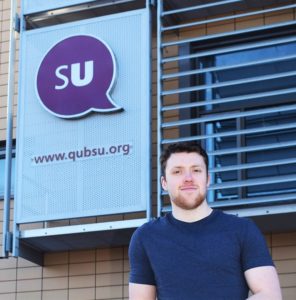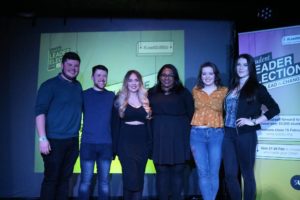As we approach the 20th anniversary of the Good Friday Agreement, Northern Slant is running a feature series on identity and stereotypes in Northern Ireland. This week Alina Utrata interviews Connor Veighey. You can follow him on Twitter @ConnorVeighey.
Connor Veighey is someone who doesn’t fit into the usual stereotypes about Northern Ireland. The recently-elected president of Queen’s University Belfast Students’ Union, who has an Irish name and grew up in a unionist area, isn’t so much a “square peg in a round hole” as he is a peg that disagrees with the concept of holes in the first place.
“[My] hybrid-identity more often leads to exclusion by each community rather than inclusion by both. However, these assumptions serve to show the inappropriateness of stereotypes,” Connor explained. “I don’t consider myself a member of either the unionist or nationalist community. I don’t belong to any religion – Protestant, Catholic or otherwise. . . .I would describe myself as a post-nationalist.”
In a previous post on Northern Slant, I wrote about how Northern Ireland highlighted the problems of dividing places and people into nation-states. Connor would agree that nationalism and the nation-state system are increasingly not working in the modern world.
“[My identity as a post-nationalist] is based in part on the outdatedness of the idea of nation-states in a globalized world and, more prominently, on a cosmopolitan view of the equality of duties possessed by individuals,” he said. “For example, my responsibility to help someone struggling to get by in east Belfast is equal to that of helping someone struggling to get by in west Belfast.”
For Connor, there are many other cleavages in Northern Ireland besides sectarianism.
“Lisburn has seen its share of sectarian violence and of the Troubles – my mum would tell stories of passing British soldiers on the way to school and bomb scares in the city centre even when I was little,” he explained. “[But] my own impression is of a society where, yes, an ethnic hegemony is apparent, but which is primarily driven by its social conservatism and class divide, which are not necessarily connected to the constitutional question.”

As a politics student at QUB, Connor notes that he is aware the creation of “others” often drives group behaviour. But this “othering” can be caused by all sorts of divisions, not just sectarian ones. And, for Connor, the emphasis on ethnic divisions doesn’t really reflect the realities of Northern Ireland.
“The outdated ethnic binary is deeply erroneous, not only because it fails to account for every other ethnicity living within Northern Ireland but because it fails to adequately comprehend the social and political dynamics at play in NI.
“There is not a unionist community and a nationalist community, a Protestant community and a Catholic community – there is one community. We are one people, united by a common struggle for social, economic and political equality.”
However, no political party in Northern Ireland represents Connor’s views.
“All parties ultimately come down on one side of the United Kingdom / united Ireland binary rather than any presenting a post-nationalist vision of Northern Ireland’s future,” Connor said. “They only discuss the geographic position of borders rather than their desirability or their practicality in the modern world.”
Connor sees the current state of politics in Northern Ireland, in part, as a result of the way that the peace agreement was structured in 1998. He hopes that the twentieth anniversary of the Good Friday Agreement provides an opportunity for the community to reflect on the current state of affairs.
“The structures established by the Good Friday Agreement provide numerous incentives for parties to entrench themselves in their respective ethnic strongholds rather than reach out or seek to change the status quo.
“It is therefore my hope that this anniversary is taken as an opportunity to critically review our political structures, our attitudes and our social context. Then there may come a realization that, while we may be products of our history and our society, our society may also be products of us and a feeling of political homelessness may be translated into a sense of political inspiration.”
The challenges of identity and division in Northern Ireland may be difficult but, as Connor says, they may offer an opportunity to re-examine how we think about the future.

Also published on Medium.
